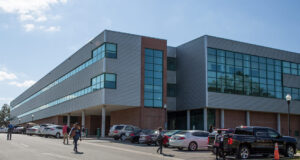
The coronavirus pandemic has undoubtedly caused a great disruption in the lives of FAMU students. Despite the switch to remote learning, the university’s plan to reopen during the Fall 2020 semester involved the inclusion of a small number of in-person classes.
The Florida Board of Governors in late summer approved the university’s Fall 2020 reopening plan, which includes the gradual return of students and faculty to the campus in phases. During this time, social distancing guidelines suggested by the Centers for Disease Control and Prevention (CDC) to limit person-to-person contact will be adhered to.
According to FAMU’s Fall 2020reopening plan, the changes implemented include the adoption of a “hybrid approach” to courses where both online and in-person instruction will be used, the mandatory use of face masks, and limiting the use of building and classroom occupancy.
For some students, the university’s switch to online learning has not been preferable.
“I feel like I’m learning more efficiently while on campus,” said Keliecia Parker, a junior transfer student from Orlando, of the one class that she takes on campus. “I would prefer in-person classes to online classes.”
Kamryn Marshall, a junior from St. Pete, feels the same. “I feel like I wouldn’t take the class as seriously if it were online,” she said of the broadcast journalism class she currently takes on campus.
Both Parker and Marshall believe that the university has taken appropriate measures for the current in-person classes being taught during the coronavirus pandemic.
“What [the university] is doing so far seems effective,” Parker said in response to the social distancing guidelines that have been adopted.
“There are literally no other classes while I’m in my class — we’re the only class in the building … I think [the university has] done a good job of [implementing] social distancing and maintaining the coronavirus on campus,” Marshall said.
Despite the necessary safety measures being taken by the university, having so few classes on campus due to social distancing can negatively affect the schedules of students attending said classes.
“[The on campus class] can negatively affect my schedule considering I only have one class out of six on campus,” Marshall added.
Despite the preference for in-person instruction, neither Parker nor Marshall believe that the university is ready to completely reopen.
“I don’t feel as though the entire student body [would take] the necessary safety precautions for the virus,” Parker said.
Marshall shares the same sentiments. “I don’t think that the entire university should reopen not because of the university itself but because of the students. I don’t think that everybody will do what they’re supposed to do right now.”
While Florida A&M is not planning on completely reopening during the Spring 2021 semester, the measures taken by the university to begin the return to normalcy have been found to be sufficient by the FAMU Board of Trustees, the Florida Board of Governors, and the students. Hopefully, the continual implementation of social distancing guidelines will eventually lead to the return of traditional life and student culture at the historically Black university.